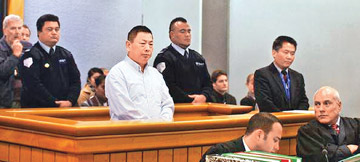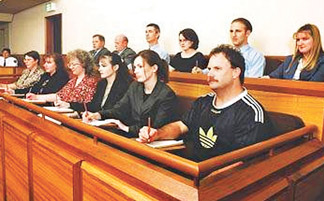|
The right way on reporting legal proceedings:
Court guide to steer clear of courting trouble
Gaston de ROSAYRO
|

At a court trial
|
Last week we discussed how reporters could effectively capture the
dramatic moments in the courtroom and how to do it safely, without being
hauled into the dock for contempt. The law according to Charles’
Dicken’s character Mr. Bumble may be an ass. But never underestimate the
powers of the court and take things lightly because you will decidedly
be courting trouble.
That is because anyone who flouts the court laws will be charged with
contempt of court. We will deal with the subject of contempt in another
discourse. The penalties could be harsh and include fines or jail terms.
So always ensure you abide by the laws of the judiciary.
There are certain basic aspects of court reporting that reporters
should familiarise themselves with. From the time somebody is about to
be charged with an offence, up to the moment when the court finishes
dealing with it, the case is said to be sub judice. In practice, sub
judice normally starts when a person is arrested, charged or a warrant
is issued for their arrest and ends when the judge or jury gives a
verdict. In civil cases, sub judice normally starts when legal papers
are lodged with the court and ends with the court's decision.
Sub judice is a Latin phrase meaning ‘under judgement’. It is
pronounced ‘sub joo-da-see’. While a case is sub judice, journalists are
strictly limited as to what they can write.
This is to make sure that they do not interfere with the job of the
court in giving the defendant a fair trial. We shall look in detail in a
moment at what we are and what we are not allowed to write.
|

A jury in court |
It is the job of the courts, and nobody else, to decide whether or
not the person charged did in fact commit the crime. Nobody should be
tried and convicted by crime or court reporters, in the columns of a
newspaper or over the air waves.
Of course, it is also important to society that journalists (or
anyone else for that matter) have the right to talk about things, and we
shall talk more about that later in this article. But where two
important rights clash, one has to be limited in the interests of the
other.
For example, anyone has the right to drive from one town to another.
However, because the people who live along the way have the right to
walk safely around their homes, the speed at which you can drive may be
limited. And because people driving the other way also have their
rights, you may be limited to driving on only one side of the road.
In the same way, the right to talk about a crime is limited in order
to protect the defendant's right to a fair trial. People who have done
nothing wrong should not be afraid that they will be punished if they
are charged, perhaps by mistake, or if someone takes legal action
against them in a civil case. They should be able to be confident that
they will be cleared of the accusation. Otherwise, all people will live
in fear of the law, instead of feeling that it is there to protect them.
A court is the place where society employs specially trained people
to decide whether or not a person really did something wrong. If a crime
has been committed, then the police need to find the person responsible.
That is their job. But it is not the job of the police to punish that
person. That is the job of the courts, and before they punish anyone
they need to be convinced that the police have caught the right person -
the person who actually committed the crime.
At a trial, the police or their lawyer present the evidence which
makes them believe that the defendant is the guilty person, and the
defendant (or their lawyer) presents evidence in an attempt to show that
the police are wrong. When the court has heard all the evidence, the
jury (if there is one) or the judge (if there is no jury) decides
whether the defendant is guilty or not guilty.
What can we report? When a crime has been committed, reporters need
to tell their readers or listeners about it. They may talk to people who
saw the crime, or whose property was stolen or damaged, and quote the
things those people have to say. However, as soon as the police have
caught someone they believe to be responsible for that crime, and are
about to charge them with that offence, then reporters are limited in
what they can say about the crime.
You can report the fact that the crime happened, that someone is
being charged and any facts about it which are not likely to be
challenged in court.
If a man has been charged with breaking into a shop and stealing Rs.
50,000 in cash and goods worth Rs. 2,500, then we must report the fact
that he has been charged. We may write: “A man has been charged with
burglaryfollowing the break-in at the Budget Price supermarket at the
weekend. Santiago de Horaputhraya, 328, of Averiwatte Road Hendala, has
been charged with stealing Rs. 50,000 in cash and goods worth Rs. 2,500
from the shop on the night of February 23.
It is important to note that we did not say that Santiago actually
committed the crime - that is not a fact.
It is the job of the courts to decide whether or not he did it. All
we said is that Santiago has been charged with the crime - that is a
fact - and that there was a break-in at the shop at the weekend - that
is also a fact.
Anything which reporters publish about the details of the crime or
the suffering of the victims, after someone has been charged, could
interfere with the court's job. If there is to be a jury, they could be
influenced by what they read in the papers, or by what they hear in the
news. If the sad stories of how the victims suffered continue to be
published right up to the day of the trial, the jury may feel bitter and
angry towards the accused person. This will make it difficult for him to
have a fair trial.
Even in cases where there is no jury system, judges do not like cases
being commented on, or background being published, until the case is
finished. The courts are there to act on behalf of ordinary people, so
it is important that they carry out their business in public, for all to
see.
It is a vital principle that Justice must not only be done, it must
be seen to be done. In other words, courts have to do the right thing,
and the public have to see and understand that they do so.
Reporters are members of the public, and so are the readers or
listeners they represent.
Reporters as such have the right to attend court cases, and a duty to
be there whenever possible on behalf of their readers and listeners who
cannot be there. Court reporters may be given a special place in the
courtroom to sit, called a press gallery. Essentially, though, there is
no difference between the court reporter and any other member of the
public in the courtroom.
There are three main reasons why journalists report court cases: to
encourage public confidence in the law, to help the law deter future
crime and to get strong news stories.
[email protected]
|



